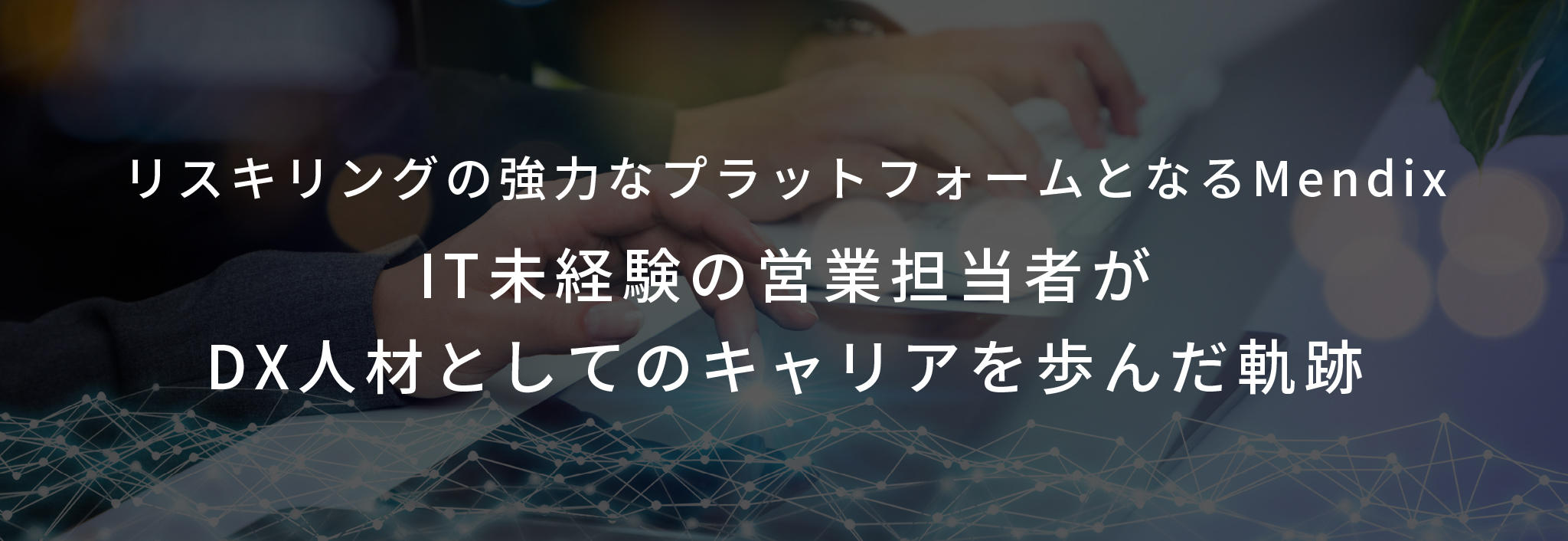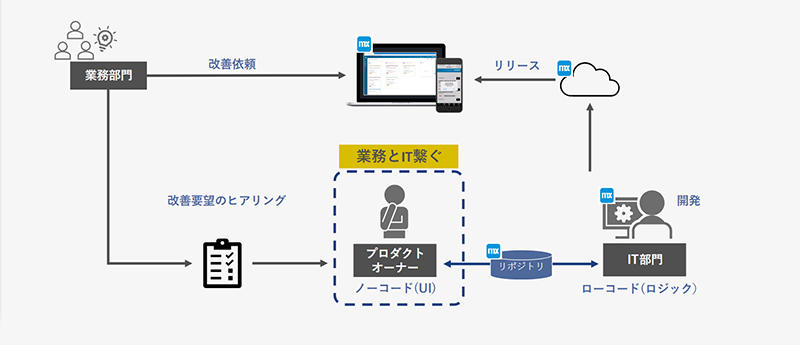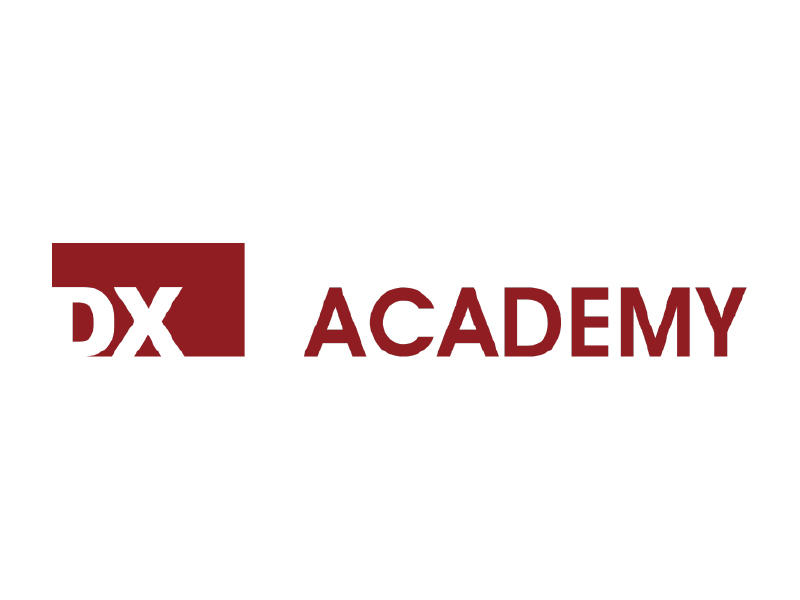

Through reskilling, many companies DX As Macnica continues to consider human resource development, its sales staff with liberal arts backgrounds are taking the first step toward a new initiative through collaboration with the systems department. Mendix It is a self-study program with a unique curriculum. DX Academy* Macnica, which developed a new career from learning through 2 General Product Sales No. 2 Department number 3 Together with Keita Hayashi, he worked on a project with Hayashi. IT Headquarters IT Management department IT We asked Takuya Ishida, Manager of the Engineering Department's Product Engineering Division, about the background of the project and its results.
*DX in-house production support service provided by Arnetz
Self-learning and the dilemma of not being able to apply it to work
Mr. Hayashi, please tell us about your daily work.
Hayashi: As a sales representative in the semiconductor division, my job is usually to supply semiconductor chips purchased from overseas to domestic and Japanese companies overseas. I work as a salesperson, making proposals to customers, creating estimates, and managing delivery dates. I have no experience in IT such as system development, and am a sales person with a liberal arts background.
I have heard that Mr. Hayashi himself has had the experience of learning Python as part of reskilling. Please tell me about the background.
Hayashi: I still work as a salesperson on a daily basis, but when I thought about my career, I felt anxious because I didn't have anything to leave behind. At that time, I decided that I wanted to develop with solid technology like a field application engineer involved in semiconductor sales. I felt the desire to pursue the joy of having people touch what I had created. We chose Python because it has been attracting attention as a programming language connected to AI, which has been a hot topic recently.

What do you expect from the company?
Hayashi: Our vision for 2030 is to become `` Service & Solution Company continues to create new value by connecting skills and knowledge from all over the world to realize a prosperous future society.'' The person required for this purpose is defined as someone who can accompany customer transformation by utilizing digital technology. I believe that having skills in digital technology in addition to sales will help me get closer to this image.
What about self-invested learning?
Hayashi: I actually went to a school for about 6 months that mainly consisted of online classes, but it was quite difficult because I started from the basics that science majors learn, such as theoretical learning and design. That's the honest truth. Although I received a grant from the government for reskilling, I invested a considerable amount of money myself.
I believe that you have acquired basic IT skills through reskilling, but have you gained any results?
Hayashi: It was great to have the opportunity to learn with colleagues from various backgrounds and aspirations, but it's difficult to say if I could immediately apply it to my daily work. There is no opportunity to immediately use Python in a sales position, and if you really want to make use of it, you have no choice but to change jobs. Even if you change jobs, it is difficult to build up your career from scratch.
Challenges as a systems department
Mr. Ishida from the systems department, who promoted the project together with Mr. Hayashi, what kind of issues did you face?
Ishida: Originally, the IT division had outsourced system development, but with the emergence of low-code tools on the market that allow development to be started in a more abstract form than scratch development, we took this opportunity to develop the system in-house. We launched the project with the goal of creating an organization capable of development. I also wanted to eventually expand this know-how outside the company and lead to a movement in which the systems department could directly contribute to business. Therefore, we started a new development project by utilizing the low-code development platform we provide to our customers.
Specifically, what kind of area was the development project in?
Ishida: Most of the work we have done so far has been system development aimed at improving operational teams, which have a large amount of work and are easy to standardize. On the other hand, progress was not being made in areas that directly lead to operational improvements in the sales department. Development using packages requires large-scale development, but using low-code tools increases the number of situations in which you can make various improvements, including small improvements in the field. Therefore, we decided to focus on the operations surrounding SAP, which is our core system, and start with systems that have room for improvement as a sales department. Specifically, sales staff were not able to extract the data obtained from SAP in the form they wanted, so they had to process it using Excel and other tools to provide information to their own activities and customers. Therefore, we considered a system for improving business operations that would allow us to easily obtain the necessary information using low-code tools.
So Mendix is used here.
Ishida: There was a trend to try Mendix, which we had originally provided to customers as a business, and we thought it had great benefits, such as its compatibility with SAP, program manageability, and development process management. . Mendix 's strength is that it provides all the functions necessary for maintainability and governance in an enterprise. The same thing can be done by combining various solutions with complementary functions, but there is a high hurdle in terms of man-hours and there are concerns that governance and management will deteriorate, so we decided that Mendix was the best option.

This time, Mr. Hayashi from the sales department is participating in the project, but have you considered moving forward with the systems department alone?
Ishida: There is no doubt that low-code tools have abstracted development itself and made it easier for anyone to get involved, but it can be difficult if you don't have a certain level of general DB knowledge and flowchart concepts. I honestly feel that way. On the other hand, members of the system department lack on-site knowledge, so it is difficult for the system department to proceed with the project alone. In terms of increasing the number of IT human resources, it is necessary to consider the option of whether to seek human resources externally or internally, including within the business department.
However, there was hope that people like Hayashi, who had learned basic technology, would be able to contribute to efforts toward in-house production while learning. Of course, starting small works well with low-code tools. One way to do this is to have people from the field who have knowledge of the business participate.
Mr. Hayashi, how did you become involved in this project?
Hayashi: I reskilled myself to acquire IT skills, but I didn't have the opportunity to put them to use in my work.When I told a member of the same business division that I had learned Python as a self-investment, he said, I heard that they handle the code tool Mendix in-house. Ishida's department was considering a new internal development project using Mendix, and I was asked to participate in the project to make use of my on-site knowledge. I think we were a good match for someone who had on-site knowledge as well as basic IT learning experience, and we were approached.
Outline of the project co-created with the systems department
What kind of project was it specifically?
Hayashi: This is a PoC initiative to solve problems in the sales field, and it is a system that allows information obtained from SAP to be extracted in a way that is appropriate for the field. For example, the information necessary for managing delivery dates can be obtained from SAP, but the reality was that there was too much information and much of it was unnecessary. Specifically, it is sufficient to have three pieces of information: order receipt, order placement, and inventory, but this is a system that allows you to carefully examine and obtain these pieces of information. In fact, it used to take about 15 minutes to compile information about a single item, but now it can be easily extracted with one click. The mechanism is very simple, but it's a big accomplishment for salespeople who handle many items.
What kind of system did you use to proceed with the project?
Hayashi: This time, I am the product owner, and Ishida is in charge of coordinating the infrastructure, including the core system. Additionally, there is another engineer who was actually in charge of development at Mendix. The product owner's role is to communicate business requirements and the direction of business improvement to the development engineer, and to communicate requests for improvements to what has actually been developed. Therefore, in order to understand Mendix in advance, I am learning the basics of Mendix at DX Academy, which allows self-training.
Ishida: My role was to coordinate the provision of necessary data to integrators that support the construction and operation of SAP. The system is simple, and the project only takes about a week, or about 15 hours in terms of development time. All meetings were held online, and only the final review was completed in about an hour when everyone gathered together.
What was it like actually participating in the project?
Hayashi: I don't know how much I could have contributed, but I once again feel that if the number of frontline staff with knowledge of systems, including IT knowledge, increases, we will definitely be able to quickly resolve business improvements. Ta. By being involved in the project, I was able to feel that business improvement was a reality.
Ishida: I think we need to continue to work on things like Scrum development, but one of the big themes is whether the system department should play the role of product owner or whether it should be delegated to each department. I realized that when someone like Hayashi, who has IT knowledge and business knowledge, comes on board, the project progresses much more smoothly. Of course, as the scale of development increases, it may be better for the systems department to become the product owner, but in areas like this one where individual optimization can be achieved by accumulating small improvements, members of each department are better suited. There are many cases where it would be suitable. I think it will become even more interesting if such members grow as developers using low-code tools.
What do you think worked well this time?
Ishida: To be honest, defining requirements in any development project requires a lot of effort, and is normally the part that requires the most time. It was very important that we were able to ask Hayashi, who has business knowledge, and I believe that the reason we were able to define the requirements in such a short period of time was because of Hayashi's field and IT knowledge.
The appeal of Mendix, a low-code development platform
What do you think of Mendix, the low-code development platform you used this time?
Hayashi: This may not be directly related to this project, but I once created a web application using Python as a self-study, and I needed to deploy the code I had written. This work was quite difficult, and many of my colleagues who studied with me had a hard time as well. I honestly remember being impressed by how easy it was to use Mendix, such as being able to deploy with just a click. I feel that this is one of the major attractions of low-code development platforms.

Do you feel like you can develop your own applications using Mendix?
Hayashi: To be honest, I think there are some difficult parts. Even though it's low-code, it requires a lot of study, and in reality I only learned about a few dozen hours at DX Academy, so the hurdles are not low in terms of developing applications that can be used by many people. . Of course, I feel that I can create simple things like task management and daily report management that I learned at DX Academy. Practical experience must be accumulated.
Even though it is a low-code development platform, it is not a magic wand that anyone can create.
Hayashi: That's right. I am still working as a semiconductor salesperson, and this project was not an instruction from the company, but rather one that I participated in outside of work hours. Although there are some areas where I don't have enough time, I'm sure that being involved in business improvement from the perspective of on-site DX will be of great use in my future career, and I definitely want to further develop my skills.
How do you evaluate Mr. Hayashi's efforts in the systems department?
Ishida: Mendix, which can be abstracted in the sense of developing developers, has the potential to be extremely powerful, and based on what Hayashi learned at DX Academy, he is trying out things like pair programming together such as Scrum development. If I continue to do so, I believe I will be able to start a career like no other. Compared to an approach like scratch development, you can definitely start your career as a DX person.
About future initiatives
What are your thoughts on the future?
Hayashi: The increase in the number of front-line members like me who are able to focus on semiconductor sales as their main job while improving business operations as a pair of shoes will match the future human resources that the company is looking for. I think. There is a need for people who can utilize digital technology to transform customers, and I believe that acquiring this skill will become a weapon for me whether I work at my current company or move to another company. I am. If I can spread the word about my activities as a success story to those around me, including how to appeal to the company, the environment will become a better one.
Ishida: As a system department, we are in a situation where we need to expand collaboration with the business department, but in reality, there are quite a few members of the business department who have IT sense like Hayashi. There is no doubt about that. As you communicate with these members using Mendix 's developer portal and other tools, some people may progress in their careers toward development, while others may progress toward product ownership. I think it would be great if I could build my career together with the participating members. I feel that we have tremendous potential both as a systems department and as a company.
As a result of this initiative, the system department, field department, and new business department that handles Mendix are about to start working as a virtual organization, and ultimately the semiconductor department will promote operational improvements within the company and sell the results externally. He says he has set goals that he can pursue. Management expects Mendix to be an organization that forms the core of the 2030 Vision, which aims to become Service & Solution Company, and major efforts to promote DX centered on Mendix are likely to accelerate in the future. Mendix is attracting attention as a platform for reskilling, so why not come and experience its capabilities at DX Academy?
Related Links
[Use case collection]A special medicine for “waste” in work! Business improvement starting with low code
This book explains how the low-code platform "Mendix" can be used to optimize the management of data, maintenance, and warehouses, and its role as a magic bullet for eliminating "waste in business."



